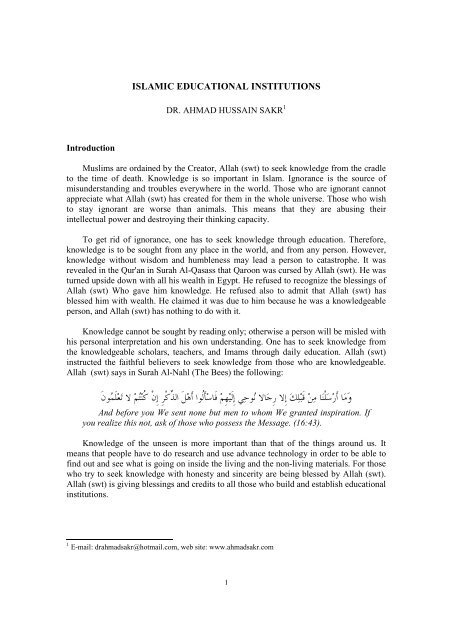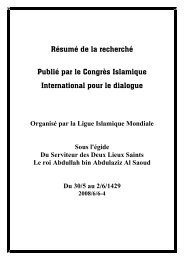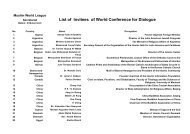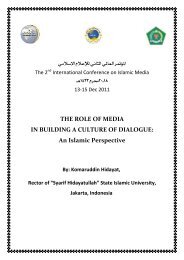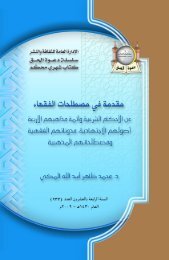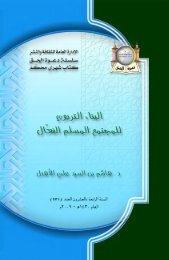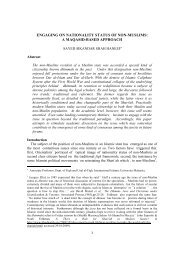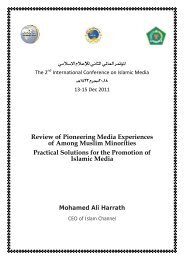AHMAD SAKR - ISLAMIC EDUCATIONAL INSTITUTIONS
AHMAD SAKR - ISLAMIC EDUCATIONAL INSTITUTIONS
AHMAD SAKR - ISLAMIC EDUCATIONAL INSTITUTIONS
- No tags were found...
Create successful ePaper yourself
Turn your PDF publications into a flip-book with our unique Google optimized e-Paper software.
<strong>ISLAMIC</strong> <strong>EDUCATIONAL</strong> <strong>INSTITUTIONS</strong>DR. <strong>AHMAD</strong> HUSSAIN <strong>SAKR</strong> 1IntroductionMuslims are ordained by the Creator, Allah (swt) to seek knowledge from the cradleto the time of death. Knowledge is so important in Islam. Ignorance is the source ofmisunderstanding and troubles everywhere in the world. Those who are ignorant cannotappreciate what Allah (swt) has created for them in the whole universe. Those who wishto stay ignorant are worse than animals. This means that they are abusing theirintellectual power and destroying their thinking capacity.To get rid of ignorance, one has to seek knowledge through education. Therefore,knowledge is to be sought from any place in the world, and from any person. However,knowledge without wisdom and humbleness may lead a person to catastrophe. It wasrevealed in the Qur'an in Surah Al-Qasass that Qaroon was cursed by Allah (swt). He wasturned upside down with all his wealth in Egypt. He refused to recognize the blessings ofAllah (swt) Who gave him knowledge. He refused also to admit that Allah (swt) hasblessed him with wealth. He claimed it was due to him because he was a knowledgeableperson, and Allah (swt) has nothing to do with it.Knowledge cannot be sought by reading only; otherwise a person will be misled withhis personal interpretation and his own understanding. One has to seek knowledge fromthe knowledgeable scholars, teachers, and Imams through daily education. Allah (swt)instructed the faithful believers to seek knowledge from those who are knowledgeable.Allah (swt) says in Surah Al-Nahl (The Bees) the following: And before you We sent none but men to whom We granted inspiration. Ifyou realize this not, ask of those who possess the Message. (16:43).Knowledge of the unseen is more important than that of the things around us. Itmeans that people have to do research and use advance technology in order to be able tofind out and see what is going on inside the living and the non-living materials. For thosewho try to seek knowledge with honesty and sincerity are being blessed by Allah (swt).Allah (swt) is giving blessings and credits to all those who build and establish educationalinstitutions.1 E-mail: drahmadsakr@hotmail.com, web site: www.ahmadsakr.com1
Types of InstitutionsThe system of education and the type of institutions followed throughout the historyof Islam and in the different parts of the Muslim World may be summarized as follows:1. Tutoring2. Mosque Educational System3. House Educational System4. Zawiyah Educational System5. Takiyah Educational System6. Private Islamic Schools: A- Kuttab, and B- Contemporary Private Schools.7. Public Islamic Schools8. Madrassa – Daily Evening Schools9. Weekend Islamic Schools10. Islamic UniversitiesVerification of InstitutionsTutoringTutoring was one of the systems of education. It is still being used in the Muslimworld. This type of education was for the privileged ones, and it was expensive. This typeof system has been adopted by Islamic scholars on a voluntary basis in different parts ofthe Muslim world. They made it available to all interested and qualified students.Education through tutoring produced the best scholars in the history of the Muslimworld. Indeed every outstanding scholar was a tutored student to another scholar. Someof the famous scholars to be mentioned here are: Bukhari, Muslim, Abu Dawood, Nisai,Tarmizi, Ibn Majah, Ibn Hisham, Tabari, Shafii, Hanbali, Hanafi, Maliki, and Ja’farietc. The number of those scholars exceeds hundreds of thousands.Mosque Educational SystemWhile the mosque is a place of worship, it is also a place for a complete way of life.Any activity for the pleasure and love of Allah (swt) is considered a matter of worship.The mosque played a very vital role in the field of education throughout the history ofIslam. The Mosque of the Prophet in Madinah was the best example of an IslamicInstitution. Others such as Al-Azhar Mosque in Cairo, Egypt; then Masjid Al-Qairawanin Fez, Morocco; Masjid Al-Umawi in Damascus, Syria, and so on.Zawiyah SystemZawiyah is an Arabic word to mean a corner, a section or a part of a place. Thissystem of education did exist in many parts of the Muslim world. One may find a personwho sets aside a room in his house, or the ground floor of his building for religious andeducation instruction. Sometimes a scholar is requested rather than being appointed to do2
the same thing. Sometimes the owner of the property does perform the same duty byhimself.This system of education is open to the neighbors and to any interested individuals.There are no fees required. Attendance is not obligatory, but socially people miss theabsentees, and accordingly they look after them.While this system of education is open to everyone, the system is not a co-education.One may find in some places certain facilities for men and women. In many Zawiyahsystems, women have their own places with a Muslim lady teacher, while men have theirown male teacher.In the Zawiyah, the teacher explains the teachings of Islam, starting from Qur’an,Hadith, Seerah, law (Shari’ah) etc. Most of the time the teacher addresses his audience asa public lecture, as a teacher to a class full of students, or as a tutor to some individuals.Sometimes he uses group discussion, a seminar, a workshop or a group involvement. Thelatter is important when it involves memorization and recitation of Qur’an.In any and every place, the Zawiyah was used as a place of worship for regularprayers and sometimes for the Friday Congregation Prayers. Rarely the Zawiyah wasused for the two yearly feasts of Islam, namely feast of Fast-Breaking (Eidul Fitr) orFeast of Sacrifice (Eidul Adha).Takiyah SystemTakiyah is an Arabic word to mean a place to rely on when a person is underfinancial difficulty. These places accepted elderly people, and the Takiyah became anursing home for the senior citizen. The place of Takiyah used to be independent fromthe mosques, but many places were close to the mosques or even a separate section in themosque.People were taken care by the government and the society. The Takiyah turned forsometimes to be a place for the elderly as well as for the lazy.In Islam, there is a religious retreat during the last ten days of the month of Fasting(Ramadan). The mosques are the places for such retreat. The person who goes forreligious retreat is to go into isolation for spiritual benefits. He reads Qur'an, prays,meditates, and contemplates, while he is fasting. The Takiyah has also been used as areligious retreat, as well as a place for Islamic education.In most of the Muslim world, Takiyah system was changed to become as a schoolwith room and board. They played the role of a monastery. Students of different agegroups have benefited from the Takiyah system. Students are to benefit from all theprivileges of being close to or within the Masjid.3
Private Islamic Schools (Kuttab)The whole Muslim world has private academic and Islamic schools. The authorwishes to bring to the attention of the readers those schools that are called Kuttab. Thelatter is an Arabic word, the meaning of which is derived from book, writing and ateacher who helps to read and write. (Kataba, to write) and (Kitab, Book). The plural ofkuttab is Katateeb.This type of educational system is described as follows: A teacher male or female,called Shaikh or Shaikha assumes the responsibility of opening an elementary schoolhaving a kindergarten. This is done in his/her house. Children of different age groups siton the floor in a circle, while the teacher carries a stick and teaches the students alltogether at the same time. He uses the method of group learning loudly. Then he dividesthem into small groups according to their educational capacity and background. He alsouses the tutoring system to as many individuals as possible. Students learn how to read,write and memorize the Qur’an mainly. He teaches ethics and disciplines toward thestudents. He uses the stick to reach all the students in the circle.Most of the children in the Muslim world had to go to the Kuttab before going topublic schools or even to the well organized private schools. These Katateeb have done atremendous job in the field of education and religion. A good number of the present dayeducators including the author of this paper had to go through this system of educationbefore going into the formalized system of education.Contemporary Private SchoolsOther private schools would be the ones established by individuals, a group ofindividuals or Islamic societies and educational organizations. The Muslim World hasenormous number of these schools. Most of those schools are based on profit basis. Onlythose established by organizations were able to offer partial scholarships to some of theirstudents.Those institutions were needed in great number as the public schools system failedtheir missions in delivering good quality of education.Those schools were designed to accommodate kindergarten, elementary and highschools levels. Very few individuals or groups, if any, were able to establish a College ora University.At those schools, students were able to learn Islam and other academic fields ofsciences. Students were trained to pray noon prayers at least. They were trained to livethe teachings of Islam, and they were trained to be disciplined according to the moralteachings of Islam.Teachers and administrators were requested to practice the teachings of Islam at leastin Public along with their students. These educational institutions have contributed to the4
The Muslim world during the 20 th century started establishing Islamic Universities.They offer Bachelors, Master Degrees and Doctorate (Ph.D.) in Islamic studies. They dida good job but the system of education is limited to religious studies. They were deficientwith scientific education to be added to the religious studies. Recently some IslamicUniversities started teaching both Religious and Scientific education.Islam is a total way of life, and it includes all varieties of educations because it isalso a complete system. We hope and pray that Muslim universities will produce scholarswhose backgrounds are simultaneously religious and scientific studies. They should keepin mind the contemporary systems of life.Final RemarksEducation without teachers and scholars does not mean anything. Moreover,Education without professional Institutions does not mean anything either. Thereforeseeking knowledge should be through professional Muslim scholars, who haveprofessional Educational Institutes. Early Muslims did a good job in spreading educationall over the world. Muslims of today should study what the early Muslims scholars havedone. Then they should take the initiative and do something now before it is too late. Weare losing our children and our history by sending them to non-Muslim schools.We pray to Allah (swt) to guide the Muslim Ummah to assume the responsibility indisseminating the Islamic Education through out the whole world. Ameen.Teaching Arabic and Islamic StudiesIntroductionMuslims in North America have increased their number since the fifties till nowfrom approximately of 100,000 to ten millions. A good number of them came fromdifferent parts of the world, and the others are those who accepted Islam. There areMuslims who are now the fourth generation too.The language of the Qur'an is Arabic, and Muslims have to pray daily five timesusing the language of the Qur'an in their prayers. Muslims all over the world feel honoredto learn the language of the Qur'an. They do enjoy reciting the Qur'an. The recitation hasits beauty, melody, rhythm, lyric, rhyme and meaning. The echoes of the voices of thereciters touch the hearts of the listeners. They are moved spiritually to the extent thatmany shed tears on their faces.Muslims throughout history tried their best to learn the language of the Qur'an. Theyopened schools and taught one another Qur'an: Language, Hifz (Memorization),Recitation, Rules and Regulations for Recitation and Meaning. Through such processesMuslims learn the meaning of the Qur'an, and tried to apply the Qur'anic teachings intheir private and public life. Automatically, they had to study Tafseer; Books of Hadith;6
Sirah of the Prophet; Sirah of the Shahabah (companions); Fiqh of Practicing theTeachings of Islam; The Study of Halal (lawful) and Haram (Prohibition); Legalapplication and so on. No one can learn Arabic language without studying the Qur'an.Hence, Qur'an became the CORE for studying Arabic language.Muslims of North America are not different from the rest of the Muslim world. Theyare more privileged than the Muslims outside this country. They have all types oftechnology at their disposal to be utilized for the sake of learning Arabic and theteachings of Islam. They have Satellites, TV, Radio, Video, Audio, C.D roms, and otherfacilities at a minimum price. They have no excuse not to learn it or to teach it to others.Muslims of America are usually highly educated. Most of them speak 2-3 languages. oneof these languages is Arabic. However, they did not study it to understand enough themeaning of the Qur'an. Therefore the learning of the Qur'anic language and the teachingsof Islam became a must for every Muslim.Types of InstitutionsThere is a variety of institutions that teach either Arabic as a language, or as areligious language. Those who teach it as a language, have confined it to a limited benefitsuch as: Arabic for Business; Arabic for Diplomats; Arabic for Missionaries; Arabic forCIA; Arabic for finding pitfalls in the Qur'an; Arabic as local dialects; Arabic as a secondlanguage; Arabic for research, and so on and so forth. The following is a partial list oforganized institutions that deal and teach Arabic as a religious or as a Secular language:A. Weekend Islamic SchoolsMuslims in North America have their own weekend Islamic Schools. They teachtheir children Arabic language and Islamic teachings. Most of them teach the Arabiclanguage for the sake of reading Qur'an without understanding its meaning. The non-Arabic speaking Muslims make sure that their children should read the whole Qur'an. Atthat time they hold graduation party (Ameen Party).A large number of children are asked to memorize few Surahs from the Qur'an. Theleast number is three and maximum twenty Surahs. The Arabic texts are not the best, theteachers may not be qualified, the number of hours is very minimum, the atmosphere inthe class is not Conducive for learning, the methods used are old fashion, and etc. Thebenefits are very little. The same thing is to be said about the teachings of the message ofIslam.B. Full-time Islamic SchoolsSister Clara Muhammad schools were among the pioneers in establishing private fulltime Islamic Schools. In a period of fifty years they have improved tremendously theteachings of Islam as well as the Arabic Language. However their financial resources, aswell as the technological resources are meager. The results of their efforts are stillminimal.7
C. Bilingual ProgramsSome public schools have allowed the Arab children to learn Arabic as a secondlanguage. There should be a minimum number of children 15-20 to open a class. Theylearn Arabic as a language, as a culture and as a civilization. The language is devoid of itsspiritual beauty. Most of the teachers are non-Muslims.D. Arabic as a Second LanguageSome Boards Of Education have allowed local ethnic groups to teach their childrentheir mother tongues at their community centers. Children were given credits as a secondlanguage. Unfortunately Muslim Communities did not benefit yet from such a privilege.E. Home SchoolingVery few families have used this approach. The benefits of this system of educationare good in preserving the identity of the children, as well as in preventing them from thevices of the society. However, the benefits of learning the Arabic language and Islamicteachings are limited. Children were isolated from the society.F. Institutions of Higher EducationThe American and Canadian Academic Institutions of Higher Education are eitherstate or private ones. The State Universities are mainly Secular Institutions, but theprofessors are either Orientalists, Christian missionaries under different titles, orSecularists. Most of these institutions do not allow Muslim Professors to teach, andespecially if they are practicing Muslims. The Muslim professors should be critical oftheir religion and its culture. Very insignificant numbers of Muslim Educators wereallowed to teach the Arabic language or Islam. In either case the benefits that came fromthose institutions were minimum; if not against Islam and Muslims.The Private Academic institutions belong mainly to their religious denominations:Catholic, varieties of Protestants and Jews. Muslim professors are rarely to be found insuch places.Some state and private institutions have already received certain endowments fromMuslim Countries (individuals, societies and governments). The benefits of suchapproach are still minimal.Some other Academic institutions of Higher Education have started by Muslims.Some of these are American Islamic College of Chicago; The Islamic Institute of Arabicand Islamic Sciences in America of Virginia; The American Pacific Islamic University inL.A; The Islamic University of California (defunct). The American Open University inVirginia, The American Islamic University in Kansas; The School of Islamic socialStudies in Virginia, and etc. These institutions do need to be evaluated separately. Theirachievements have been minimal. Some did not start yet.8
G. Hifz Al-Qur'an SchoolsSome schools for the memorization of Qur'an, its language, and the teachings ofIslam have already started in North America. These schools have been established by nonArab Muslims. They are mainly from the Indian Subcontinent. These schools are servinga little number of children, and the benefits to the society would be mainly to produceHafiz of Qur'an.RecommendationsIf Muslims of North America are to succeed in preserving their identity and flourishas Muslims, they have to establish Academic Institutions. Such schools should start fromK-12, as well as colleges and Universities. These institutions should have good facilities,best teachers and professors, enough money to maintain, operate, and a specialendowment to safeguard their continuity. The text books should be directed toward acomprehensive type to life based on Qur'an, Hadith, and the Sunnah of the Prophet.These Islamic institutions should make sure that they are to prepare, train andgraduate the future leaders of America and the Muslim world. Muslims of America haveto recognize that it costs money to educate, train, raise and produce leaders. Thereforethey should be generous enough towards such a noble cause.Muslims of America have to learn the experiments and the experiences of otherimmigrants who were able to do such activities to their own communities. In this waythey were able to preserve themselves. They flourished through their short history inAmerica.IV.Final RemarksMuslims of America are composed of a heterogeneous group of people. Theyrepresent almost all Muslims of the world. They are well to do, well established andhighly educated. They are present in every state and province.Their Community Centers and Masjids should be utilized as Academic Institutions.These Centers and the Institutions should be built, maintained and operated by Muslimsof America. They should not anymore raise money from the Muslim World. They haveenough money from within to do what is needed. Those who have to run such institutionsshould be committed Muslims. They should try to make the Arabic and IslamicAcademic Institutions as role models for others. Then, the non-Muslims will be willing tosend their children to study at the Islamic Institutions Insha-Allah.9


